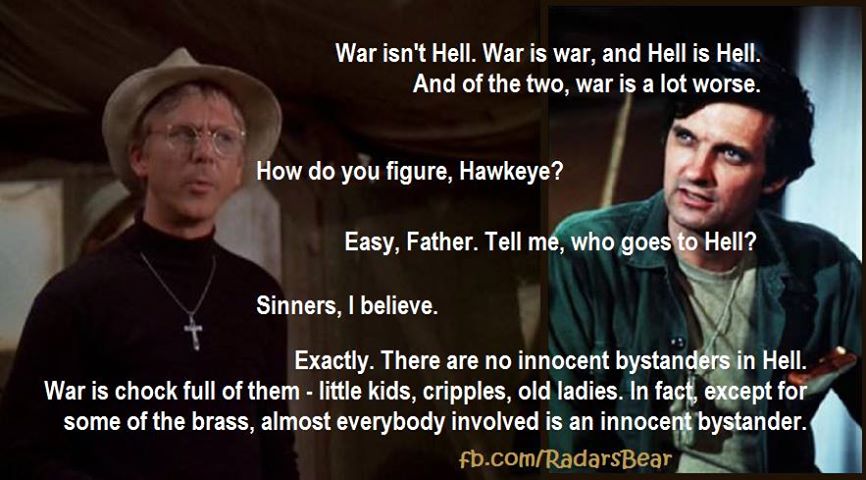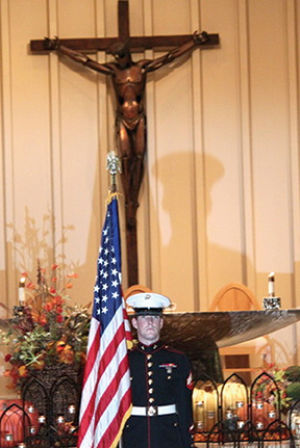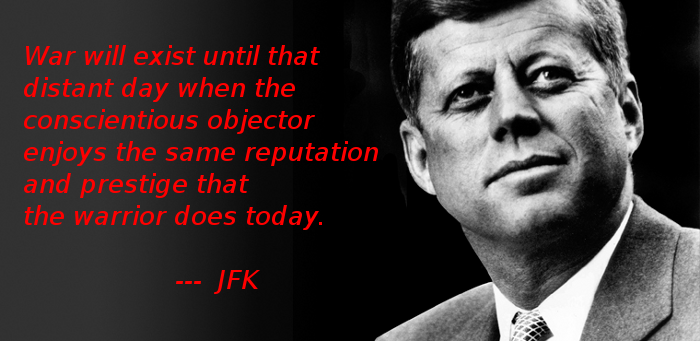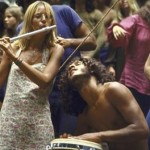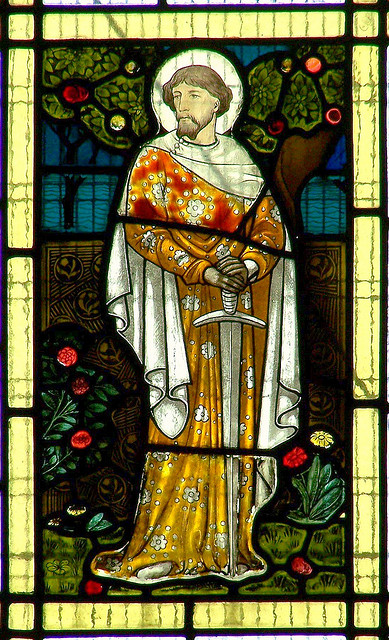Monthly Archives: November 2013
NCR: Asking the right questions
The National Catholic Reporter ran an editorial today called “Questioning our assent to militarism.” In it they write: “No one is suggesting that Catholics anywhere should go without spiritual guidance and support.” Exactly.
The question is: What kind of spiritual guidance and support are soldiers receiving from Catholic military chaplains? Chaplains are essentially federal government workers…might 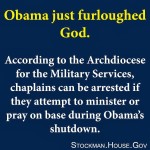 that not compromise them a little? We saw recently how the the furlough situation presented Catholic chaplains with challenges, in terms of their allegiances and autonomy, due to their being ultimately agents of the state. So it’s not out of line to suggest that they might be compromised in other ways, too, as a result of this. It would be silly to think that Church and State rarely, if ever, have conflicts of interest, and I think we saw during the furlough who is really in charge here (not the Catholic Church). If the government can prevent chaplains from saying Mass, the government can probably prevent them, or “strongly discourage them,” from saying or doing other things that the government doesn’t want them to say or do because of those conflicts of interest.
that not compromise them a little? We saw recently how the the furlough situation presented Catholic chaplains with challenges, in terms of their allegiances and autonomy, due to their being ultimately agents of the state. So it’s not out of line to suggest that they might be compromised in other ways, too, as a result of this. It would be silly to think that Church and State rarely, if ever, have conflicts of interest, and I think we saw during the furlough who is really in charge here (not the Catholic Church). If the government can prevent chaplains from saying Mass, the government can probably prevent them, or “strongly discourage them,” from saying or doing other things that the government doesn’t want them to say or do because of those conflicts of interest.
Just one example: When we called AMS to ask them how many Catholics had become Conscientious Objectors since 2002, they said they didn’t know. When we asked them what the process is to become one, they said they didn’t know, weren’t involved in that process, and advised us to go ask a military recruiter. Daniel Baker also said that, “No one knew about it on base, neither did the chaplains, because when I went to talk to one chaplain, he just talked about the Just War theory.” That seems to be a huge gap in the pastoral counseling provided, especially in wars such as these, does it not?
The NCR article goes on to state: “One of the more tragic elements in [Joshua] Casteel‘s journey from warrior to pacifist was his failure to find a Catholic chaplain with whom he could discuss his growing reluctance to participate in war. He said he found commanding officers more sympathetic to his point of view and more willing to smooth the way to conscientious objector status than he encountered in any of the priests he consulted.”
I know that if I worked for Apple, I wouldn’t go around my workplace criticizing Apple. Everyone who has ever had a job knows that you have to be a “team player.” Maybe that’s why AMS is recruiting, more and more, from within the military. After ten years of this “war” on “terror,” it’s probably getting harder and harder to recruit from the outside. Maybe they have better luck with people who have already been drinking the Kool-Aid for a while. Maybe at some point you stop seeing any conflicts of interest at all.
Editorial: Questioning our assent to militarism | National Catholic Reporter
Quick Question
Imagine if a parishioner at your Church shot and killed an intruder in
his home. Should this man be honored as a “hero” at Mass? Should we
give him a standing ovation after partaking in the body and blood of
our Lord and Savior Jesus Christ, the Prince of Peace? Of course not!
A person was killed. It was probably a traumatic experience.
Impressionable youths are present. It would be entirely inappropriate
to celebrate or glorify this act of violence in the House of God.
Now imagine if a parishioner didn’t kill one person with a gun.
Imagine he killed about 10 people with a rocket launcher (nine
innocent civilians, including four children, and one enemy combatant).
Furthermore, this “enemy combatant” was not in the parishioner’s home
but rather in his own home on the other side of the world. This
“combatant” or “militant” never posed a direct threat to the parishioner’s family,
property, or way of life; rather, he posed an indirect threat to some
vague abstraction called the “national interest.”
Should we honor this person at Mass? Does it send the right message?
It’s generally wrong to kill people. Does one of the worst sins become
an act of “heroism” simply because the killer was wearing a government
uniform?
If it’s inappropriate to celebrate or honor an individual act of justifiable homicide in the House of God, why is it appropriate to celebrate and honor those who kill on a larger scale for more dubious reasons?
It seems odd to me. Does it seem odd to anyone else?
Way Out of Hand
When reading about Veterans Day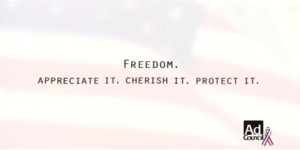 ceremonies that will be sponsored by the Air Force and ROTC, and those that will be sponsored by Catholic Churches, there is virtually no difference.
ceremonies that will be sponsored by the Air Force and ROTC, and those that will be sponsored by Catholic Churches, there is virtually no difference.
On Veterans Day weekend, it also becomes painfully obvious (and depressing) that the message we will hear at church on war is also in absolute lockstep with the “messaging” created by the Ad Council (formerly known as the War Advertising Council) on behalf of the federal government back in 2002 for the Campaign for Freedom:
Peggy Conlon, president and chief executive of the Ad Council, said, ”According to research, Americans are looking for messages that will inform, involve and inspire them during the war on terrorism.”
And freedom was a theme that resonated. ”Freedom embodies the principles upon which this nation was founded,” Ms. Conlon said. ”Freedom is our strength. However, freedom is also at risk. The ‘Campaign for Freedom‘ recognizes that it is every American’s responsibility to protect the foundation of our nation, and this is the heart of the strategy.
The only difference is that the federal government had to pay the Ad Council a lot of money to produce and distribute certain messages to United States citizens to “involve and inspire” them, and the Christian Churches have distributed those same exact messages, unqualified, for the past decade for free.
At a Veterans Day Mass at St. Barnabas Roman Catholic Church “members of the community who have served or are currently serving to participate in the liturgy, which will begin with a procession that includes veterans carrying the respective flags of the Army, Navy, Air Force, Marines and Coast Guard. Veterans from various wars, including World War II, Vietnam and Korea, will serve as gift bearers for the liturgy. The Mass will also feature the official songs and hymns of each U.S. military branch sung by the St. Barnabas adult and children’s choirs.”
A Veterans Day Mass will be scheduled to take place on Friday, Nov. 8, at St. Anthony’s Catholic Church in Colorado County where veterans will be introduced after mass. Fifth and sixth grade students from St. Anthony School will then host a presentation for the veterans, performing a variety of military service songs. At least this one is happening after Mass, not during.
Also a tradition in Colorado County: Members of VFW Post 6113 and American Legion Post 383 participate in programs that take place at the Columbus Junior High School-Riverside Campus, Columbus Elementary School and St. Anthony School. Of course they send two guys to talk to the kids who “did not regret having to go” there. They are probably the only two Vietnam War veterans who feel that way. We wouldn’t want to send any veterans to go talk to the children who saw that war as a horrible waste of life. We wouldn’t want to send anyone to talk to the children who might be less that “proud” of what they did in Vietnam, or regret it, or see it as utterly pointless, or utterly evil. We wouldn’t want that. (See approved messaging above.)
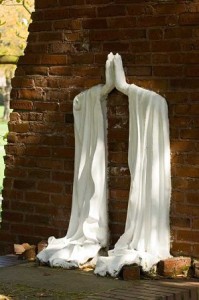
A University of Portland photo. The praying hands memorial on UP campus is site of Veterans Day ceremony.
At the University of Portland, a Veterans Day ceremony will take place after a 24-hour candlelight vigil with Air Force and Army cadets standing guard beginning at 11 a.m. on Sunday, Nov. 10. (This is the one sponsored by the Air Force and ROTC.) At least this one will only involve adults.
Saint Barnabus Catholic Church claims that the message of the Veterans Day ceremony will be “Peace on Earth.”
“The Mass will focus on peace, not violence or war,” said Kitty Ryan, pastoral associate at St. Barnabas. That’s a bold bit of lip service and Orwellian doublespeak as Kitty Ryan then goes on to say: “Since humanity has not yet discovered how to resolve conflicts in a peaceful way, war and violence remain a reality in our lives. No matter how much we are against war and violence, however, we cannot ignore the service these men and women have provided to us in defending our freedom.”
Ah! You knew it was coming. To Kitty Ryan I would say: Though violence is a reality in human experience, we, as Catholics, cannot ignore the example of Jesus Christ, who renounced it. True, Jesus did not reprimand soldiers for their chosen line of work, just as he did not reprimand tax collectors or prostitutes, but he also did not say that the soldiers will set you free; he said the truth will set you free. Then some soldiers brutally murdered Him. We tend to ignore these overly Jesus-y facts, though, on Veterans Day, because it’s not consistent with the dominant messaging approved by our sponsors.
How can we marvel that war remains a part of our lives as humans when, every time a child hears about how horrible war is, that child also has to be reminded how exciting, important, necessary, and noble it is? “Freedom is not free” and this example from the Statesman.com:
The main guest speaker of the event was Dick Jacobs, a retired Lieutenant Colonel in the Air Force …During the years of 1967 and 1968, he flew over 100 missions over North Vietnam. Jacobs gave vivid descriptions of two reconnaissance missions in particular, one in which the plane took three hits from enemy fire and made an emergency landing in which a barrier luckily stopped the plane. His stories were filled with harrowing detail and suspense and he promised to come back to share more next year.
There are plenty of examples of humans resolving conflicts in peaceful ways! John Kennedy, our first Catholic President, managed to avoid a nuclear war by responding to his enemy, at great personal risk, when his enemy reached out and tried to start a personal conversation with him. By doing so, he basically saved the world. Kennedy, too, “paid the ultimate price,” (Nov. 22 marks the 50th anniversary of his death, by the way) but I don’t suspect we’ll be hearing about his bravery and courage at Mass anytime soon. Kennedy didn’t do what the Joint Chiefs of Staff wanted him to do and what they surely told him it was necessary to do to preserve Americans’ freedom. He went rogue and acted in accordance with his conscience, doing what he felt was necessary to preserve mankind. He had to keep his dialogue with the enemy a secret, as his actions would have been seen as treasonous. Is he a hero? No. You are only a hero if you dutifully carry out the will of the State/Pentagon. Future Presidents take note: You don’t become President of the United States to save the world. Your job is to advance your country’s “interests.” (Know your place, or else…)
Not to mention, Kitty, let’s face it: stories that involve resolving conflicts in peaceful ways are simply not as glamorous and titillating as stories of war, which is why we don’t hear about them as much, or ever. But just because there is no cable channel dedicated to peacemaking (we have the Military and History channels dedicated to war making) doesn’t mean it hasn’t happened or that it can’t happen or that it doesn’t happen! As Pope John Paul II said, to reach peace, teach peace. The Church has totally dropped the ball on that. All of this “honoring” of veterans has gotten way out of hand and it sends the exact opposite message, especially to kids who are so impressionable. It sends, instead, the message of the pagan Roman adage: Si vis pacem para bellum—”If you want peace prepare for war.”
To “glorify” means to “magnify.” We go to church to glorify god and worship Him. This over-the-top Veterans Day pomp during the liturgy magnifies not God but the aims, means, priorities, and values of the state. It is a form of brainwashing, and it is disturbing to see children roped into it. It is completely unbalanced by other perspectives on war and peace, which local Catholic leadership should be there to provide. Kitty Ryan is right that war and violence remain a reality in our lives:
If pastoral associates want a Mass with a message of “Peace on Earth” on Veterans Day, she may want to start by resisting the inclination to dismiss entirely the very idea of peace and its possibilities in Christ. If JFK had believed that it was impossible for humans to resolve conflicts in peaceful ways, well, we’d be living, or not living, on a very different planet.
Our Response to Father Z
Today the National Catholic Reporter published an article on the upcoming collection for AMS called “Bishops’ support for war underpins collection for military archdiocese.” Father Z criticized the article on his blog, calling the article an “attack” on military chaplains. It is unfortunate that any form of criticism is labeled an “attack.”
Father Z believes that the collection to support the Archdiocese for Military Services is important. We believe, along with the author of the editorial, Mark Scibilia-Carver, that the comingling of militarism and Christianity raises certain questions that, after a decade of war, must be asked and addressed. We believe this is important. We see the collection for AMS as being representative of a bigger problem, one that demands an honest conversation. Some dialogue would be healthy for our Church and for our country.
We respect Fr. Z’s view, but we found his commentary to be defensive and reactionary. We wish he would have addressed the actual points Mark Scibilia-Carver brought up, in order to foster some dialogue so desperately needed, instead of characterizing negatively any Catholic who has concerns that are related to the military. If you depict someone with an opposing point of view as silly, irrational, and out-of-touch, then I guess you don’t have to address his argument.
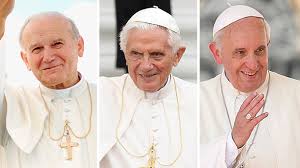
Note: Then the three popes quoted in Mark Scibilia-Carver’s article must have been on drugs. The always seem to be, in the words of Fr. Z, in “virulent tree-hugging reason free flower power mode.”
Not that anyone asked us, but this is our response to Father Z, which we wrote in the comments of his blog.
The hippies have a point here: Militarism inside the Church discourages serious reflection on the moral gravity of war. Militaristic sermons reinforce the assumption that the U.S. military is a force for good. That assumption is debatable! When priests replace serious reflection about mass violence with unchecked glorification of all things military, they fail in their duties as priests. That’s not an “attack.” It’s legitimate criticism. We need to have a dialogue about the appropriateness of militarism inside the Catholic Church. Toward that end, check out our manifesto at Catholics Against Militarism.
Father Z seems to think that anyone who criticizes the military, militarism, or U.S. foreign policy is a troop-spitting, drugged-up, hippie-flowerchild. That is not true! The Founding Fathers viewed a standing army as one of the biggest threats to liberty. James Madison wrote, “Of all the enemies to public liberty war, is, perhaps, the most to be dreaded because it comprises and develops the germ of every other.” Marine Corps Major General Smedley Butler wrote, “War is a racket…It is conducted for the benefit of the very few, at the expense of the very many.” In 1961, Dwight Eisenhower warned that the military-industrial complex created the potential for “the disastrous rise of misplaced power.” Michael Scheuer, a CIA veteran who ran the Counterterrorist Center’s bin Laden station from 1996 to 1999, wrote, “The fundamental flaw in our thinking about Bin Laden is that ‘Muslims hate and attack us for what we are and think, rather than what we do’…It’s American foreign policy that enrages Osama and al-Qaeda, not American culture and society.” I am a former Marine, a veteran of the Iraq War, and a conservative/libertarian who agrees Father Z and his readers about most theological and political issues. When conservatives accuse war critics of “attacking” the troops, they’re no different than liberals who accuse welfare critics of “attacking” the poor.
P.S. There is not a single verifiable instance of antiwar protestors “spitting” on troops returning from Vietnam. That’s an urban myth used to silence war critics. http://www.slate.com/articles/news_and_politics/press_box/2000/05/drooling_on_the_vietnam_vets.html
For the record, Father Z, neither of us here at CAM smokes hash or owns a bong. We do, however, like the guitar. You have to admit these are awesome. Let’s get coffee sometime.
St. Illtyd, Nov. 6
According to Journey to Avalon: The Final Discovery of King Arthur: Illtyd, who lived in the 7th century, was the most important soldier-saint of King Arthur’s time. According to one Welsh legend, Illtyd was one of the three Knights of the Holy Grail. He was the son of a nobleman who was married to the daughter of King Tewdrig, Arthur’s grandfather. He studied in Paris, became a disciple of St. Garmon, and then trained as a soldier in Britain. He was a skilled warrior and served Arthur in the defense of Britain. He was made captain and rose to the position of Magister Militum (Mlitary Magistrate). He was known thereafter as Illtyd Farchog (“The Knight”).
According to legend, Illtud’s warband raided Llancarfan Abbey but the monks pursued them into a bog where the earth swallowed all of them except Illtyd. Saint Cadoc, who had previously refused military service, reminded Illtyd of his religion, and advised him to become a monk. The humbled warrior decided that his true vocation lay in the service of God and he accordingly resigned his military position to withdraw from the prince’s service. He separated from his wife and spent time as a hermit in a wooded valley. He gained a reputation for his sanctity and his exceptional teaching. He died in Brittany. His feast day is November 6.
Irrelevant Social Clubs
“The churc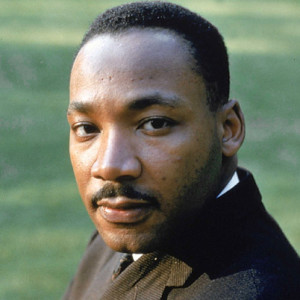 h must be reminded that it is not the master or servant of the state, but rather the conscience of the state. It must be the guide and the critic of the state, and never its tool. If the church does not recapture its prophetic zeal, it will become an irrelevant social club without moral or spiritual authority.”
h must be reminded that it is not the master or servant of the state, but rather the conscience of the state. It must be the guide and the critic of the state, and never its tool. If the church does not recapture its prophetic zeal, it will become an irrelevant social club without moral or spiritual authority.”
Martin Luther King, Jr.
Some Background
Here is an essay I wrote about how and why CAM started, published on November 1. The impetus is even more fully explained in my essay “Innocence and Sorrow” which was published in Issue 7.1 of Relief, a journal of Christian literary expression.
Ghosts of Jeju (documentary)
A documentary about the struggle of the people of Jeju Island, South Korea, who are opposing the military advance of the United States, just as their parents and relatives did in 1947. They are being arrested, jailed, fined, and hospitalized for nonviolently resisting the construction of a massive naval base that will accommodate America’s “pivot to Asia,” and will destroy their 400 year old village and their UNESCO protected environment.
With careful attention to detail and chronology, Tremblay lays out the case justifying the Gangjeong villagers’ fervent protest against yet another military oppression of their island, highlighting the role of the anti-base activists, including many Korean Catholic priests and nuns, ordinary Korean people, and activists from many other countries. He also explains the endangered marine life on rare coral reefs now being dredged out of existence, and the villagers’ simple and sustainable lifestyle that will be lost once the base is built…
Tremblay was still in the early stages of learning about Jeju history when he was on the island to film the protests in 2012. He described how he was told by several people how he would not really understand the history until he visited the April 3 Museum, which documents a massacre that took the lives of thousands of Jeju Islanders. The massacre occurred starting on that date in 1948, in response to an uprising of the people there, and the oppression and genocide continued in several incidents until 1950. The uprising was then characterized by the government as a Communist plot; it is now seen as simply a peasant rebellion.
The cruelty of that massacre, during which over 30,000 women, children, and elderly people were shot down and villages were burned, is seared into the cultural memory of that place. The leadership of the Korean military by the U.S. military at that time is documented in detail in the museum exhibits.
Here is another article from The Heights at Boston College: Chomsky, Activists Protest Base on Jeju Island
A Priest’s Letter to His Bishop
The Most Reverend Robert J. Cunningham
The Chancery
240 E. Onondaga Street,
Syracuse, New York 13201 Dear Bishop, Hope this letter finds you well. My purpose in writing you is to share with you my feelings and thoughts about this weekend’s second collection for the Archdiocese Military Services. Those who have experienced the trauma of war certainly do need our assistance for their full recovery, as so many do suffer with Post-Traumatic Stress Disorder (PTSD). I have had the opportunity to both read as well as attend a workshop by Edward Tick, a Clinical Psychotherapist, who has done extensive work with veterans and PTSD. The violence of war, as Tick notes, is a major trauma to the soul that no drug can effectively heal. As so many veterans say “War is Hell”, raises the question, “Why as a faith community, by our silence and lack of conscience formation regarding war and the military, send our sons and daughters to hell/war?” It is very apparent why this weekend has been selected for the collection as to coincide with Veterans’ Day. For us, in our Catholic faith, the day also is the feast of St. Martin of Tours. His story of conversion centuries ago is still a challenge for us today as Catholics. Two themes stand out: the encounter with Christ in the form of the poor, and the conviction that the way of Christ is the way of nonviolence. Upon his conversion, he saw his military life as totally being incompatible with the Gospel and with life in Christ. This insight prompted Martin to present himself to his military commander to request a discharge from the army. “I am a soldier of Christ, and it is not lawful for me to fight,” he said. St. Martin of Tours’ life and words seem to resemble very closely a talk this past summer by Pope Francis. He said, “The true force of the Christian is the force of truth and of love, which means rejecting all violence. Faith and violence are incompatible! Faith and violence are incompatible! The Christian is not violent, but (s) he is strong. And, with what strength? That of meekness, the force of meekness, the force of love.” It seems as though two competing allegiances are crying for our attention. To which do we honor – the one that upholds militarism or the one that proclaims the Gospel of Life? The Eucharist is the celebration of Christ’s non-violent and unconditional love. It was on the night of the First Eucharist that Jesus said to put away the sword. And then the following day, the Non-violent One, did not succumb to violence, revenge or retribution but showed the power of non-violent love over hate. These are challenging times for us as a nation and Church, as we confront issues that put the lives of so many people at risk. We have to ask ourselves as Church leaders, “How are we to preach the Gospel of peace in a time of endless wars? How are we to preach the Gospel of non-violence in a country immersed in rampant militarism?” These questions challenge us as a Church to the spiritual and moral leadership we need to give our people and nation. For these reasons of conscience, I will be withholding the materials related to the AMS Collection for this coming weekend. I pray that we can authentically become a Church of non-violent love, that by our witness we will help lessen war and violence in our world. Fraternally in Christ, Fr. Timothy J. Taugher,
Pastor
Saint Francis of Assisi Parish
Binghampton, New York 13901
